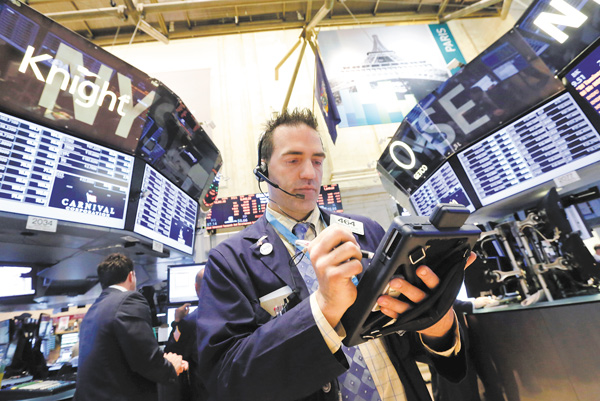Confidence at 5-year high


Trader Gregory Rowe works on the floor of the New York Stock Exchange on Tuesday. A jump in home prices helped send the stock market higher.
Associated Press
WASHINGTON
Home prices are surging, job growth is strengthening and stocks are setting record highs. All of which explains why Americans are more hopeful about the economy than at any other point in five years.
Investors Tuesday celebrated the latest buoyant reports on consumer confidence and housing prices, which together suggest that growth could accelerate in the second half of 2013.
Greater confidence could spur people to spend more and help offset tax increases and federal-spending cuts. And the fastest rise in home prices in seven years might lead more Americans to put houses on the market, easing supply shortages that have kept the housing recovery from taking off.
Tuesday’s report from the Conference Board, a private research group, showed that consumer confidence jumped in May to a reading of 76.2, up from 69 in April. That’s the highest level since February 2008, two months after the Great Recession officially began.
A separate report showed that U.S. home prices jumped nearly 11 percent in March compared with a year ago, the sharpest 12-month increase since April 2006. Prices rose year over year in all 20 cities in the Standard & Poor’s/Case-Shiller home-price index.
The economic news helped send the Dow Jones industrial average up 106 points to close at a record. The Dow has rocketed nearly 18 percent this year. And the Standard & Poor’s 500 stock index is on track for its seventh-straight monthly gain, the longest winning streak since 2009.
Surging stock prices and steady home-price increases have allowed Americans to regain the $16 trillion in wealth they lost to the Great Recession. Higher wealth tends to embolden people to spend more. Some economists have said the increase in home prices alone could boost consumer spending enough to offset a Social Security tax increase that has reduced paychecks for most Americans this year.
The Conference Board survey said consumers also are more optimistic about the next six months. That should translate into greater consumer spending, substantial growth in hiring and faster economic growth in the second half of 2013, said Thomas Feltmate, an economist with TD Economics.
Michael Quintos, head of a Chicago advertising agency that helps small businesses market themselves through social media, sees more optimism at work and among friends and relatives.
“A year ago, I had more friends asking me if I knew anybody who was hiring,” Quintos said. “Now I have more people who are hiring asking me if I know anyone looking for a job.”
At work, Quintos is finding it easier to land customers. In the past couple of months, businesses that have asked about his services have been more likely to follow through and hire him. A year ago, most were wary.
“I’ve had more work than I can handle,” Quintos said. As a result, his firm hired a Web designer last week.
The Conference Board found that optimism is growing mostly among those earning more than the median household income of roughly $50,000. For those households, the confidence index jumped to 95.1 from 85.3.
 43
43
